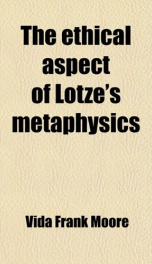the ethical aspect of lotzes metaphysics

Purchase of this book includes free trial access to www.million-books.com where you can read more than a million books for free. This is an OCR edition with typos. Excerpt from book: CHAPTER III. Conception Of The World : The World Teleological And Spiritual. A TTENTION will be confined in this chapter to two aspects -- only of Lotze's cosmologythe world as teleological and as spiritual. The problem of the unity of the world we shall reserve for later consideration in connection with Lotze's idea of God. Both the fundamental conceptions with which we are here concerned are in themselves ethical, and are inspired by an ethical motive as well. Teleologythe doctrine of final causesnecessarily involves . the concept of plan or end, which is essentially ethical in content. As used in ethics, this concept doubtless implies purpose consciously directed towards an end. Whether or not it is granted that teleology in the broad sense likewise contains this implication, it must at least be allowed that the teleological conception implies a goal whither things and events tend by forces inherent in them, or a plan within which things stand related as parts to a whole, and are perfectly intelligible only by reference to the whole. In this sense the concept is still ethical. Progress towards a goal implies a good realized by such progress ; the recognition of a relation of parts to the whole implies a meaning which conditions this relation. Thus we are unable to avoid terms which have at least a distinct ethical reference. The concept of spiritual existence is not less obviously ethical. To be spiritual is to exist for self, in some vague sense, at least. Self-existence is the sine qua non of ethical conductthat is, of self-determination in distinction from determination by external forces. To be spiritual is the primary condition of personal being, and only personal beings are ethical, since for them only can the good be an end, or conduct be possible. ...
Info about the book
Author:
Series:
Unknown
ISBN:
1112028145
Rating:
3/5 (2)Your rating:
0/5
Languge:
English
Users who have this book
Users who want this book
What readers are saying
What do you think? Write your own comment on this book!
write a commentif you like the ethical aspect of lotzes metaphysics try:
Other books by this author
Do you want to read a book that interests you? It’s EASY!
Create an account and send a request for reading to other users on the Webpage of the book!


